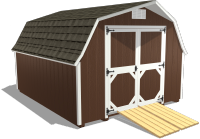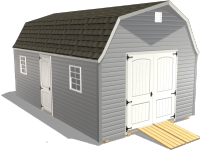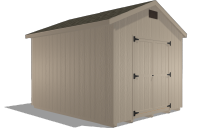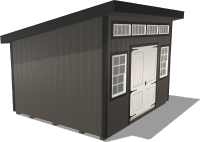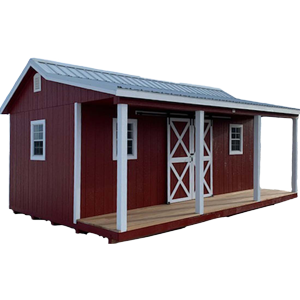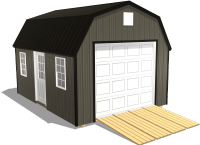4 Great Options of Fencing for Chicken Runs
by Dakota Storage Buildings, on July 03, 2023
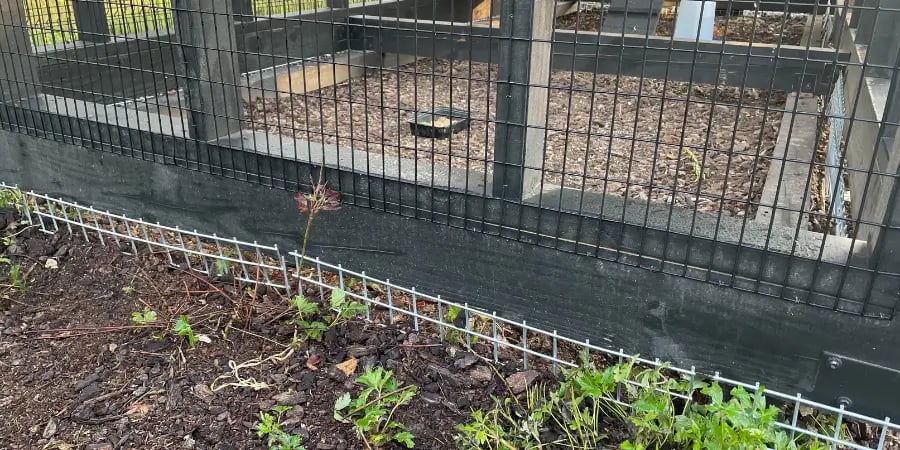
Chicken runs and their fencing act as a barrier between your chickens and the vast world outside, containing your flock within a designated space and protecting them from potential predators. The right fencing can be the key to a balance between your chickens' need to explore and your peace of mind about their safety. Whether you're a beginner just stepping into the world of raising backyard chickens or a seasoned chicken keeper looking to upgrade your existing setup, understanding the importance of a well-fenced chicken run is crucial for the health and happiness of your flock. Let’s look at the different materials you can use for your chicken run to determine which one is right for you.
Raising Backyard Chickens
There are so many factors to consider at the beginning stages of chicken raising. Figuring out the essentials, such as the chicken coop, feed, and water supply, can take up most of your time. However, the fencing around the chicken run is one significant aspect that often goes overlooked in the initial stages and can profoundly impact your flock's quality of life.
The chicken run acts as the outdoor playground for your flock. It's a space where they can stretch their wings, forage, and engage in natural chicken behavior while remaining safely within your property. The fencing around it is a sturdy barrier that keeps your chickens contained and safe from external threats.
Choosing the proper fencing for your backyard chicken coops and run is more complex than picking out the first option you come across. Various factors need to be considered, such as the size of your flock, the space available, your budget, and the specific threats in your area. Whether setting up your first chicken run or looking to enhance an existing one, knowing the different fencing options available and their pros and cons is the first step in making an informed decision.
Chicken Runs
Chicken runs are enclosed outdoor spaces, typically adjacent to the chicken coop, where your flock can safely roam, explore, and engage in natural behaviors during the day. It offers them the freedom to stretch their wings, enjoy the sunshine, and peck away at the ground — all within the safety of an enclosed area. These activities are not just for entertainment; they are crucial for the chickens' health and well-being. They help chickens maintain physical health through exercise and mental health through enrichment.
Providing a chicken run allows you to cater to these instinctual behaviors while maintaining control over their environment. With a run, chickens might wander too far, avoid getting lost, or become easy prey for predators. Well-enclosed backyard chicken coops and runs keep them safe, giving them the freedom they crave and the security they need.
However, the design and structure of a chicken run can vary dramatically depending on various factors such as available space, the size of the flock, your budget, and specific environmental conditions. A flock of two will require a significantly smaller run than ten. Another important consideration when planning a chicken run is the potential threats in your area. Is your backyard visited by foxes or raccoons? Do you have overhead threats from birds of prey? The type of predators common in your area can significantly influence the design of your chicken run and the choice of fencing.
Best Options for Fencing
Choosing the right fencing for your backyard chicken coops and run is a decision that significantly impacts the safety and well-being of your flock. Let's dive deeper into the various fencing options that you can consider.
Chicken Wire
Often the first thing that comes to mind when thinking about chicken fencing is chicken wire. Chicken wire, made from thin, flexible galvanized steel, forms a net-like mesh with hexagonal openings. It's readily available, easy to manipulate, and inexpensive, making it a popular choice among chicken keepers. You can quickly and easily form a perimeter around your chicken run with chicken wire, even if the area is large or irregularly shaped. However, while chicken wire can effectively contain your chickens within the run, there may be better defenses against predators. The thin wire can be cut or ripped by a determined predator. Therefore, it's best suited for areas with low predator activity or as an inner layer of fencing supplemented with a more substantial outer fence.
Poultry Netting
Poultry netting is a versatile fencing option that is made of durable plastic. It comes in various sizes and can be a practical choice if you want something lightweight and easy to install. Poultry netting, sometimes called plastic chicken wire, is resistant to rust and breakage due to its plastic construction. However, while it's more durable than traditional chicken wire in some aspects, it still needs to be more predator-proof, particularly against more significant, more determined invaders. If your area is known for aggressive predators, you may want to consider a stronger fencing option or use poultry netting in combination with another type of fencing.
Welded Wire
If your primary concern is protection against predators, welded wire fencing may be the right choice for your chicken run. The welded wire consists of rigid panels from steel wires welded together at each intersection. The result is a durable, strong fence that holds its shape well and is resistant to cutting or breaking. Welded wire fencing is often more expensive than chicken or poultry netting and harder to work with. However, the level of protection it offers your chickens can make it worth the additional cost and effort, especially if your chicken run is in an area with high predator activity.
Chain-link
Chain-link fencing could be the way for a long-lasting, highly durable option. Chain-link fences are made from steel wire woven into a diamond pattern and offer excellent security and longevity. This type of fencing is easy to work with and can keep larger predators at bay. Chain-link fencing is commonly used, making it relatively easy to find. Keep in mind, though, that smaller predators may still be able to squeeze through the diamond-shaped openings unless they're covered with a finer mesh or another layer of protection.
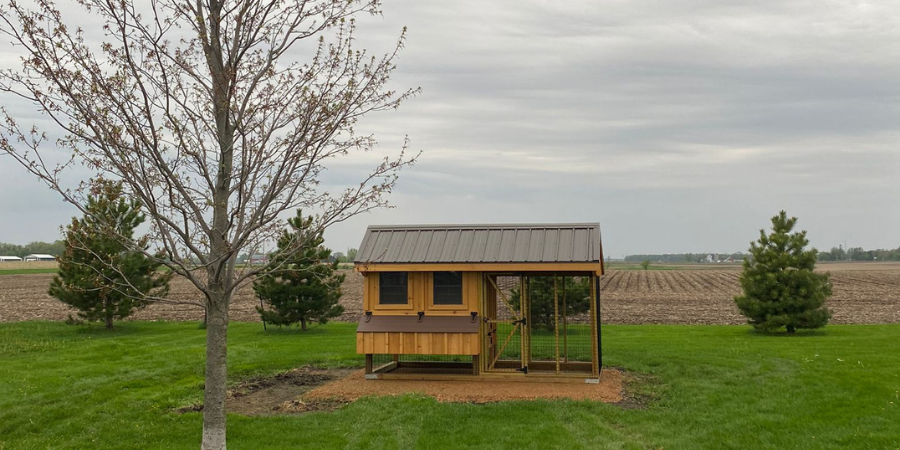
Protect Your Flock
Securing your chicken run with appropriate fencing can give you a sense of relief, knowing that your chickens have a safe place to explore and forage. However, while a solid fence is the first line of defense against predators, there are additional measures you should consider to ensure the maximum safety of your flock. Birds of prey, such as hawks or owls, can swoop down into your chicken run if it is not covered. To prevent this, consider installing a net or wire mesh over the top of the run. You can use a similar material to your fencing or opt for specialized bird netting. It's also important to regularly check the condition of your fence. Look for signs of wear and tear, rust, or damage, and promptly repair any weak spots. An overlooked hole or loose wire could allow a predator to break in.
Proper maintenance of your chicken run goes hand in hand with protecting your flock. Keeping the run clean and free of leftovers can help minimize the attraction of pests and predators. Regularly remove any uneaten food, and keep the bedding dry and clean to prevent the growth of bacteria and parasites. Remember that each chicken run and the flock will have unique challenges and needs. The most effective way to protect your flock is to observe your chickens and their environment closely, understand the potential threats in your area, and adapt your strategies accordingly.
Want to Know More?
If you're ready to dive deeper into chicken raising, our comprehensive guide on chicken coops is an excellent resource. This guide covers everything from selecting the perfect coop for your needs and the necessary coop features to the fundamentals of chicken raising. The more you know about the various aspects of raising chickens, the better equipped you will be to tackle challenges, optimize your flock's well-being, and truly enjoy the experience. Download our free guide, Evaluating the Best Fit Quality Backyard Chicken Coops, and continue your journey towards chicken keeping.





